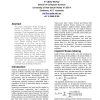Free Online Productivity Tools
i2Speak
i2Symbol
i2OCR
iTex2Img
iWeb2Print
iWeb2Shot
i2Type
iPdf2Split
iPdf2Merge
i2Bopomofo
i2Arabic
i2Style
i2Image
i2PDF
iLatex2Rtf
Sci2ools
109
click to vote
GECCO
2000
Springer
2000
Springer
Fitness Sharing in Genetic Programming
This paper investigates fitness sharing in genetic programming. Implicit fitness sharing is applied to populations of programs. Three treatments are compared: raw fitness, pure fitness sharing, and a gradual change from fitness sharing to raw fitness. The 6- and 11-multiplexer problems are compared. Using the same population sizes, fitness sharing shows a large improvement in the error rate for both problems. Further experiments compare the treatments on learning recursive list membership functions; again, there are dramatic improvements in error rate. Conversely, fitness sharing runs achieve comparable results to raw fitness using populations two to three times smaller. Measures of population diversity suggest that the results are due to preservation of diversity and avoidance of premature convergence by the fitness sharing runs.
Related Content
| Added | 24 Aug 2010 |
| Updated | 24 Aug 2010 |
| Type | Conference |
| Year | 2000 |
| Where | GECCO |
| Authors | Robert I. McKay |
Comments (0)

